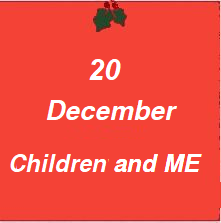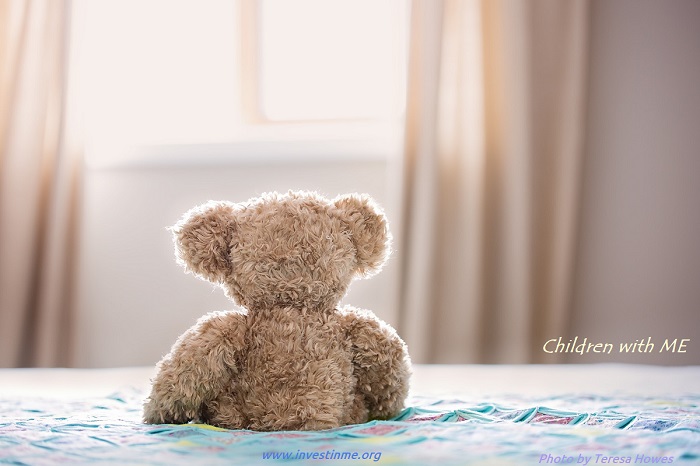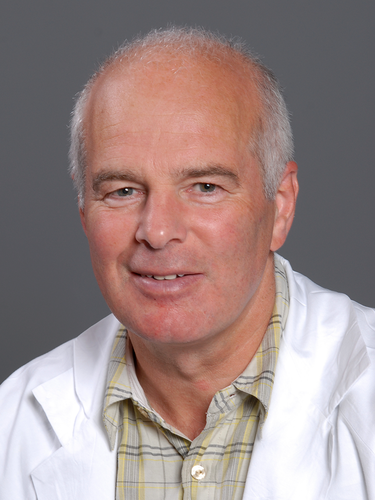
Invest in ME Research
Christmas Fund Appeal Advent Calendar
Children with ME
“There is clear evidence of the impact of ME/CFS on the education and social development of these young people. The stigma and social effects of pediatric ME/CFS include the loss of normal childhood activities and in some extreme instances, inappropriate forcible separation of children from their parents” - Institute of Medicine (IOM) Report - “Beyond Myalgic Encephalomyelitis/Chronic Fatigue Syndrome: Redefining an Illness” February 2015
For any parent the event of their
 child being diagnosed with a disease is one of the worst of experiences that they will experience.
child being diagnosed with a disease is one of the worst of experiences that they will experience.
Then to discover that there is no treatment, let alone a prospect for any cure, will likely make them search for the reasons why - expecting to find answers, but instead finding
more questions.
To realise that this disease has been ignored by governments, restricted from receiving any sensible funding for research into the disease by research councils,
and treated inappropriately by institutes supposedly responsible for excellence in care and guidance –
all this makes it even more incomprehensible.
For children, of course, the future is often upended - with possible additional consequences from the disease, apart from the direct symptoms from the condition itself.
Losing school, losing contact to friends, losing any social life, isolation.
One of the most insidious of consequences from this isolation is that it can continue into adulthood with society ignoring the prospects and potential of the young person.
Could it get any worse?
In the UK yes! What about then being branded with the scandalously contrived sound bite of pervasive refusal syndrome or some other such nonsense?
Or the stories of children and parents not being believed by social services and subsequent threats to remove children from their families into emergency placement elsewhere.
Yet despite this surreal and sometimes ugly scenario we see many examples of the resilience and courage of children with ME -
young people who deal with the effects of ME on their health and their lives and yet continue to hope and
believe in a better future.
The great majority remain positive and maintain an unbelievable lack of any resentment at their situation - blaming nobody, stoically handling this disease - quite remarkable.
Some take action themselves.
We have many examples of young people supporting the charity and using what possibilities they have to raise awareness and funds.
In the UK an estimated 25,000 children have ME - but nobody knows for sure as data is not currently collected!
There are so few paediatricians that understand ME - another failure of establishment policies.
Even those who are qualified, knowledgeable and appreciated by parents of children with ME have had difficulties - click here.

As for research - well, we have commented here and
here on
the type of research that attracts
funding thanks to a rigid system that defies any logic or concern for children.
Invest in ME Research initiated an attempt to end one of the worst of the insidious
consequences of ME - isolation - click here.
Professor Ola Didrik Saugstad - Professor (em) of Pediatrics at University of Oslo, Norway -
wrote an editorial for Acta Paediatrica.

The article highlighted the importance of proper diagnosis of children with ME and the problems arising from incorrect diagnosis and treatment
of ME in young people.
The link to the editorial is here - click here
So this day is dedicated to the amazing young people who contract this disease and yet who do not give up and somehow find the fortitude to try to live as normal a life as possible
and hope for progress and treatments.
Further Reading:
ME is like a butterfly chained to a stone
Pediatric Myalgic Encephalomyelitis/Chronic Fatigue Syndrome
Treading Water in the Media
SMILE Study
The General Medical Council -Ignoring the Elephant in the Room
Invest in ME Research
Response to Institute of Medicine Document - “Beyond Myalgic Encephalomyelitis/Chronic Fatigue Syndrome: Redefining an Illness”
To realise that this disease has been ignored by governments, restricted from receiving any sensible funding for research into the disease by research councils,
and treated inappropriately by institutes supposedly responsible for excellence in care and guidance –
all this makes it even more incomprehensible.
For children, of course, the future is often upended - with possible additional consequences from the disease, apart from the direct symptoms from the condition itself.
Losing school, losing contact to friends, losing any social life, isolation.
One of the most insidious of consequences from this isolation is that it can continue into adulthood with society ignoring the prospects and potential of the young person.
Could it get any worse?
In the UK yes! What about then being branded with the scandalously contrived sound bite of pervasive refusal syndrome or some other such nonsense?
Or the stories of children and parents not being believed by social services and subsequent threats to remove children from their families into emergency placement elsewhere.
Yet despite this surreal and sometimes ugly scenario we see many examples of the resilience and courage of children with ME -
young people who deal with the effects of ME on their health and their lives and yet continue to hope and
believe in a better future.
The great majority remain positive and maintain an unbelievable lack of any resentment at their situation - blaming nobody, stoically handling this disease - quite remarkable.
Some take action themselves.
We have many examples of young people supporting the charity and using what possibilities they have to raise awareness and funds.
In the UK an estimated 25,000 children have ME - but nobody knows for sure as data is not currently collected!
There are so few paediatricians that understand ME - another failure of establishment policies.
Even those who are qualified, knowledgeable and appreciated by parents of children with ME have had difficulties - click here.

As for research - well, we have commented here and
here on
the type of research that attracts
funding thanks to a rigid system that defies any logic or concern for children.
Invest in ME Research initiated an attempt to end one of the worst of the insidious
consequences of ME - isolation - click here.
Professor Ola Didrik Saugstad - Professor (em) of Pediatrics at University of Oslo, Norway -
wrote an editorial for Acta Paediatrica.

The article highlighted the importance of proper diagnosis of children with ME and the problems arising from incorrect diagnosis and treatment
of ME in young people.
The link to the editorial is here - click here
So this day is dedicated to the amazing young people who contract this disease and yet who do not give up and somehow find the fortitude to try to live as normal a life as possible
and hope for progress and treatments.
Further Reading:
ME is like a butterfly chained to a stone
Pediatric Myalgic Encephalomyelitis/Chronic Fatigue Syndrome
Treading Water in the Media
SMILE Study
The General Medical Council -Ignoring the Elephant in the Room
Invest in ME Research
Response to Institute of Medicine Document - “Beyond Myalgic Encephalomyelitis/Chronic Fatigue Syndrome: Redefining an Illness”
For children, of course, the future is often upended - with possible additional consequences from the disease, apart from the direct symptoms from the condition itself.
Losing school, losing contact to friends, losing any social life, isolation.
One of the most insidious of consequences from this isolation is that it can continue into adulthood with society ignoring the prospects and potential of the young person.
Could it get any worse?
In the UK yes! What about then being branded with the scandalously contrived sound bite of pervasive refusal syndrome or some other such nonsense?
Or the stories of children and parents not being believed by social services and subsequent threats to remove children from their families into emergency placement elsewhere.
Yet despite this surreal and sometimes ugly scenario we see many examples of the resilience and courage of children with ME -
young people who deal with the effects of ME on their health and their lives and yet continue to hope and
believe in a better future.
The great majority remain positive and maintain an unbelievable lack of any resentment at their situation - blaming nobody, stoically handling this disease - quite remarkable.
Some take action themselves.
We have many examples of young people supporting the charity and using what possibilities they have to raise awareness and funds.
In the UK an estimated 25,000 children have ME - but nobody knows for sure as data is not currently collected!
There are so few paediatricians that understand ME - another failure of establishment policies.
Even those who are qualified, knowledgeable and appreciated by parents of children with ME have had difficulties - click here.

As for research - well, we have commented here and
here on
the type of research that attracts
funding thanks to a rigid system that defies any logic or concern for children.
Invest in ME Research initiated an attempt to end one of the worst of the insidious
consequences of ME - isolation - click here.
Professor Ola Didrik Saugstad - Professor (em) of Pediatrics at University of Oslo, Norway -
wrote an editorial for Acta Paediatrica.

The article highlighted the importance of proper diagnosis of children with ME and the problems arising from incorrect diagnosis and treatment
of ME in young people.
The link to the editorial is here - click here
So this day is dedicated to the amazing young people who contract this disease and yet who do not give up and somehow find the fortitude to try to live as normal a life as possible
and hope for progress and treatments.
Further Reading:
ME is like a butterfly chained to a stone
Pediatric Myalgic Encephalomyelitis/Chronic Fatigue Syndrome
Treading Water in the Media
SMILE Study
The General Medical Council -Ignoring the Elephant in the Room
Invest in ME Research
Response to Institute of Medicine Document - “Beyond Myalgic Encephalomyelitis/Chronic Fatigue Syndrome: Redefining an Illness”
In the UK yes! What about then being branded with the scandalously contrived sound bite of pervasive refusal syndrome or some other such nonsense?
Or the stories of children and parents not being believed by social services and subsequent threats to remove children from their families into emergency placement elsewhere.
Yet despite this surreal and sometimes ugly scenario we see many examples of the resilience and courage of children with ME -
young people who deal with the effects of ME on their health and their lives and yet continue to hope and
believe in a better future.
The great majority remain positive and maintain an unbelievable lack of any resentment at their situation - blaming nobody, stoically handling this disease - quite remarkable.
Some take action themselves.
We have many examples of young people supporting the charity and using what possibilities they have to raise awareness and funds.
In the UK an estimated 25,000 children have ME - but nobody knows for sure as data is not currently collected!
There are so few paediatricians that understand ME - another failure of establishment policies.
Even those who are qualified, knowledgeable and appreciated by parents of children with ME have had difficulties - click here.

As for research - well, we have commented here and
here on
the type of research that attracts
funding thanks to a rigid system that defies any logic or concern for children.
Invest in ME Research initiated an attempt to end one of the worst of the insidious
consequences of ME - isolation - click here.
Professor Ola Didrik Saugstad - Professor (em) of Pediatrics at University of Oslo, Norway -
wrote an editorial for Acta Paediatrica.

The article highlighted the importance of proper diagnosis of children with ME and the problems arising from incorrect diagnosis and treatment
of ME in young people.
The link to the editorial is here - click here
So this day is dedicated to the amazing young people who contract this disease and yet who do not give up and somehow find the fortitude to try to live as normal a life as possible
and hope for progress and treatments.
Further Reading:
ME is like a butterfly chained to a stone
Pediatric Myalgic Encephalomyelitis/Chronic Fatigue Syndrome
Treading Water in the Media
SMILE Study
The General Medical Council -Ignoring the Elephant in the Room
Invest in ME Research
Response to Institute of Medicine Document - “Beyond Myalgic Encephalomyelitis/Chronic Fatigue Syndrome: Redefining an Illness”
Some take action themselves.
We have many examples of young people supporting the charity and using what possibilities they have to raise awareness and funds.
In the UK an estimated 25,000 children have ME - but nobody knows for sure as data is not currently collected!
There are so few paediatricians that understand ME - another failure of establishment policies.
Even those who are qualified, knowledgeable and appreciated by parents of children with ME have had difficulties - click here.

As for research - well, we have commented here and
here on
the type of research that attracts
funding thanks to a rigid system that defies any logic or concern for children.
Invest in ME Research initiated an attempt to end one of the worst of the insidious
consequences of ME - isolation - click here.
Professor Ola Didrik Saugstad - Professor (em) of Pediatrics at University of Oslo, Norway -
wrote an editorial for Acta Paediatrica.

The article highlighted the importance of proper diagnosis of children with ME and the problems arising from incorrect diagnosis and treatment
of ME in young people.
The link to the editorial is here - click here
So this day is dedicated to the amazing young people who contract this disease and yet who do not give up and somehow find the fortitude to try to live as normal a life as possible
and hope for progress and treatments.
Further Reading:
ME is like a butterfly chained to a stone
Pediatric Myalgic Encephalomyelitis/Chronic Fatigue Syndrome
Treading Water in the Media
SMILE Study
The General Medical Council -Ignoring the Elephant in the Room
Invest in ME Research
Response to Institute of Medicine Document - “Beyond Myalgic Encephalomyelitis/Chronic Fatigue Syndrome: Redefining an Illness”
In the UK an estimated 25,000 children have ME - but nobody knows for sure as data is not currently collected!
There are so few paediatricians that understand ME - another failure of establishment policies.
Even those who are qualified, knowledgeable and appreciated by parents of children with ME have had difficulties - click here.

As for research - well, we have commented here and
here on
the type of research that attracts
funding thanks to a rigid system that defies any logic or concern for children.
Invest in ME Research initiated an attempt to end one of the worst of the insidious
consequences of ME - isolation - click here.
Professor Ola Didrik Saugstad - Professor (em) of Pediatrics at University of Oslo, Norway -
wrote an editorial for Acta Paediatrica.

The article highlighted the importance of proper diagnosis of children with ME and the problems arising from incorrect diagnosis and treatment
of ME in young people.
The link to the editorial is here - click here
So this day is dedicated to the amazing young people who contract this disease and yet who do not give up and somehow find the fortitude to try to live as normal a life as possible
and hope for progress and treatments.
Further Reading:
ME is like a butterfly chained to a stone
Pediatric Myalgic Encephalomyelitis/Chronic Fatigue Syndrome
Treading Water in the Media
SMILE Study
The General Medical Council -Ignoring the Elephant in the Room
Invest in ME Research
Response to Institute of Medicine Document - “Beyond Myalgic Encephalomyelitis/Chronic Fatigue Syndrome: Redefining an Illness”
Even those who are qualified, knowledgeable and appreciated by parents of children with ME have had difficulties - click here.

